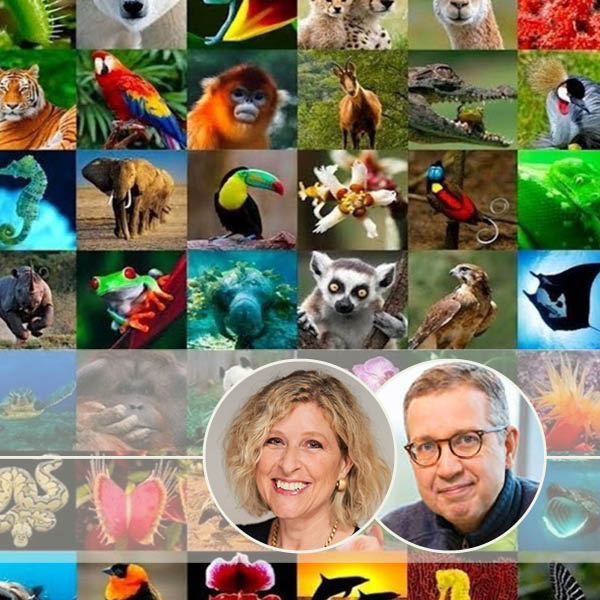Large companies and investors need to get the huge loss of biodiversity on their radar and implement measures to help nature recover. Such is the aim of PwC and the Association of Investors for Sustainable Development (VBDO), which are now jointly issuing the report ‘Biodiversity and Business‘. The joint study on biodiversity challenges and good practices is just the beginning. ‘We are working towards an annual biodiversity benchmark.’
World economy dependent on nature
Investors need to get it on their radar. Big companies need incentives to get on board with it. And the real economy needs to transform. ‘Biodiversity’ is the key word for PwC’s Sustainability Lead Alexander Spek and VBDO director Angélique Laskewitz. ‘Our social progress and global economy depend on the stability of our ecosystems and nature,’ says Laskewitz.
For years, VBDO – the association that has existed for almost 30 years and seeks to embed sustainability in companies – has been publicly raising questions about biodiversity conservation at the shareholder meetings of major Dutch companies. ‘We want biodiversity conservation to also be included in the governance of boards, but you notice that the business community struggles with this issue. Many companies find it difficult and don’t know what to do with it. They lack knowledge because it is a relatively new topic and less unequivocally measurable than climate.’
Alexander Spek, accountant and PwC’s Sustainability Lead responsible for advising clients on nature and strategy, also sees that companies often significantly underestimate the value of nature for the future-proofing of the organisation. ‘I recently spoke to a large company that is partly dependent on natural resources. Yet biodiversity was not a material issue for them, they felt. That shows that we need to work on awareness.’
Dialogue with Heijmans, Ahold Delhaize and Signify
VBDO and PwC are therefore, once again, joining forces. With the successful cooperation on tax and the annual release of the Tax Transparency Benchmark, the report Biodversity and Business. Challenges and good practices is now available.
According to Spek and Laskewitz, the survey of over 30 companies and the in-depth interviews with at least 11 listed companies, show that there is plenty of will to work with biodiversity. But it is not always easy to report on it quantitatively. ‘There is no magic KPI for biodiversity as climate has with CO2,’ Laskewitz argues.
For the study, extensive discussions were held with large companies such as Kingfish, Heijmans, DSM-Firmenich, Ahold Delhaize and Signify about their approach around biodiversity, board involvement, strategy development, target setting and the challenges involved. Laskewitz: Many companies are at a loss. Our research shows that despite the complexity of the subject, it is possible to meaningfully get started on tackling biodiversity loss.’
Without strategic anchoring of biodiversity, it’s an uphill battle
‘What surprises me is that a major construction company like Heijmans has developed a so-called ‘nature ladder’ and is applying it in practice,’ Laskewitz continues. ‘The nature ladder is a very practical and action-oriented way of using a clear step-by-step plan to make biodiversity and nature part of the strategy. Without anchoring it in the strategy, combating biodiversity loss would be an uphill battle. The examples in the report inspire me and hopefully other companies to take strategic and practical steps.’
For Spek, the interviews with the participating companies and the many examples that emerged from them show once again how essential harmonised reporting is. ‘As a stakeholder – from customer to investor – you want to form a picture of what all the measures entail and their effects. Unambiguous reporting, as required by the CSRD, ensures transparency and allows everyone to compare companies.’
Winning with the Biodiversity Benchmark
Comparing among peers, that’s what PwC and VBDO want to help with. That is why experts from PwC and VBDO are now working hard to develop a biodiversity benchmark.’We see the report that is now on the table and the talks we are having with CEOs for that purpose as the essential exploratory phase. This report is not our final goal. We need to work out what a true best practice can look like over the next few years while continuing to take action. That is why we are working towards a template where we carefully assess companies on clear metrics so that mutual comparison really becomes possible, says Spek.
‘Of course, a winner will then emerge, just like with the Tax Transparency Benchmark. However, naming a winner is a means and not an end.’We want to stimulate companies to continue working on this subject,’ says Laskewitz. Spek adds: ‘The CSRD obligation certainly helps with this as well. Biodiversity transition plans and reporting are no longer an optional long-term choice, companies have to start working on it now.’
A gentle but urgent push in the right direction
For many companies, it is yet another addition to the list of challenges.’These days, there are an unprecedented number of material issues for companies. There are a hundred topics that demand a CEO’s attention. There are plenty of threats as well as opportunities, so companies have to prioritise. I understand that, of course,’ says Spek. ‘I just keep emphasising that nature is fundamental to life on earth and forms the basis of the entire pyramid.’
Everyone has their role to play, Spek concludes. ‘It is up to Angélique and me with the cooperation between PwC and VBDO, the research into best and good practices of listed companies and the development of the future ‘Biodiversity Benchmark’ to gently but urgently push companies in the right direction. Of course, nature will not wait for us to develop the perfect approach.’

